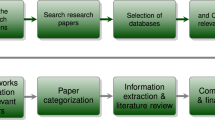Abstract
In ubiquitous computing traditional security mechanism is difficult to realize, as users do not have prior knowledge of each other and the availability of a trusted third party cannot be relied upon. Since trust is used as an elementary channel of interaction in a human society, a security model based on the real world characteristics of trust can provide the internal security before taking action, despite uncertainty and inadequate information in ubiquitous computing environment. We propose the trust based security architecture based on the human notion of trust as a mechanism to secure computing in ubiquitous environment.
Preview
Unable to display preview. Download preview PDF.
Similar content being viewed by others
References
Kagal, L., Finin, T., Joshi, A.: Trust-Based Security in Pervasive Computing Environments. IEEE Computer (2001)
Kagal, L., Undercoffer, J., Perich, F., Joshi, A., Finin, T.: Vigil: Enforcing Security in Ubiquitous Environments. In: Grace Hopper Celebration of Women in Computing 2002 (2002)
Gray, E., o’Connell, P., Jensen, C., Weber, S., Seigneur, J.M., Yong, C.: Towards a framework for assessing trust-based admission control in collaborative ad hoc applications (2002)
Gambetta, D. (ed.): Trust: making and breaking cooperative relations (1988)
Gray, W.D., Altmann, E.M.: Cognative modeling and human-computer interaction (1999)
Burt, R.S.: Decay Functions (August 1999)
Author information
Authors and Affiliations
Editor information
Editors and Affiliations
Rights and permissions
Copyright information
© 2009 Springer-Verlag Berlin Heidelberg
About this paper
Cite this paper
Iltaf, N., Hussain, M., Kamran, F. (2009). A Mathematical Approach towards Trust Based Security in Pervasive Computing Environment. In: Park, J.H., Chen, HH., Atiquzzaman, M., Lee, C., Kim, Th., Yeo, SS. (eds) Advances in Information Security and Assurance. ISA 2009. Lecture Notes in Computer Science, vol 5576. Springer, Berlin, Heidelberg. https://doi.org/10.1007/978-3-642-02617-1_71
Download citation
DOI: https://doi.org/10.1007/978-3-642-02617-1_71
Publisher Name: Springer, Berlin, Heidelberg
Print ISBN: 978-3-642-02616-4
Online ISBN: 978-3-642-02617-1
eBook Packages: Computer ScienceComputer Science (R0)




